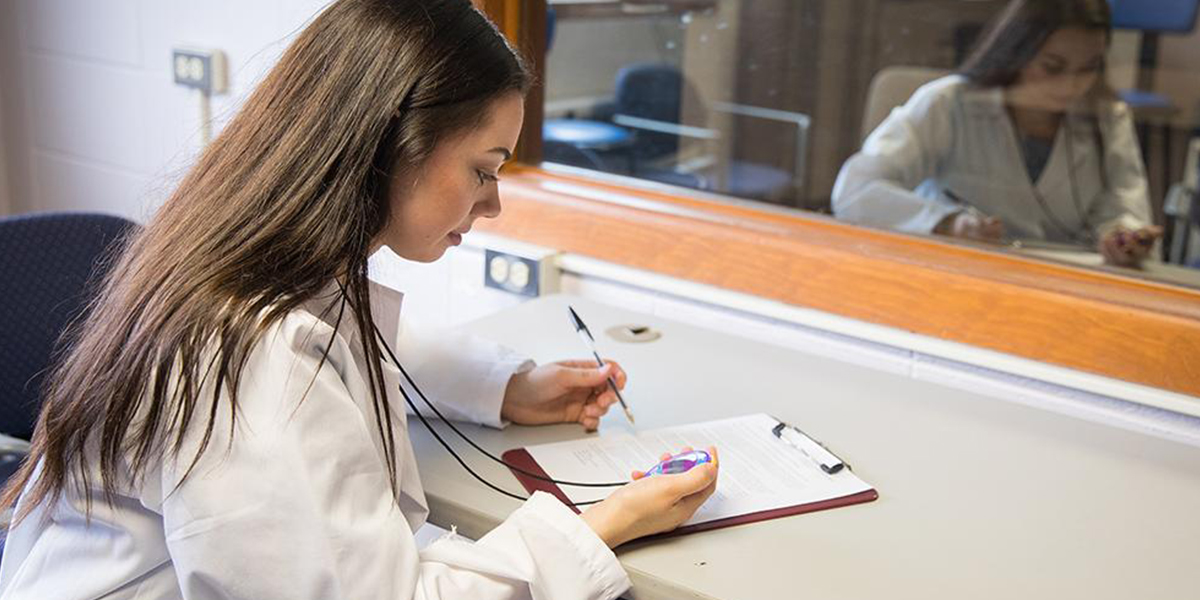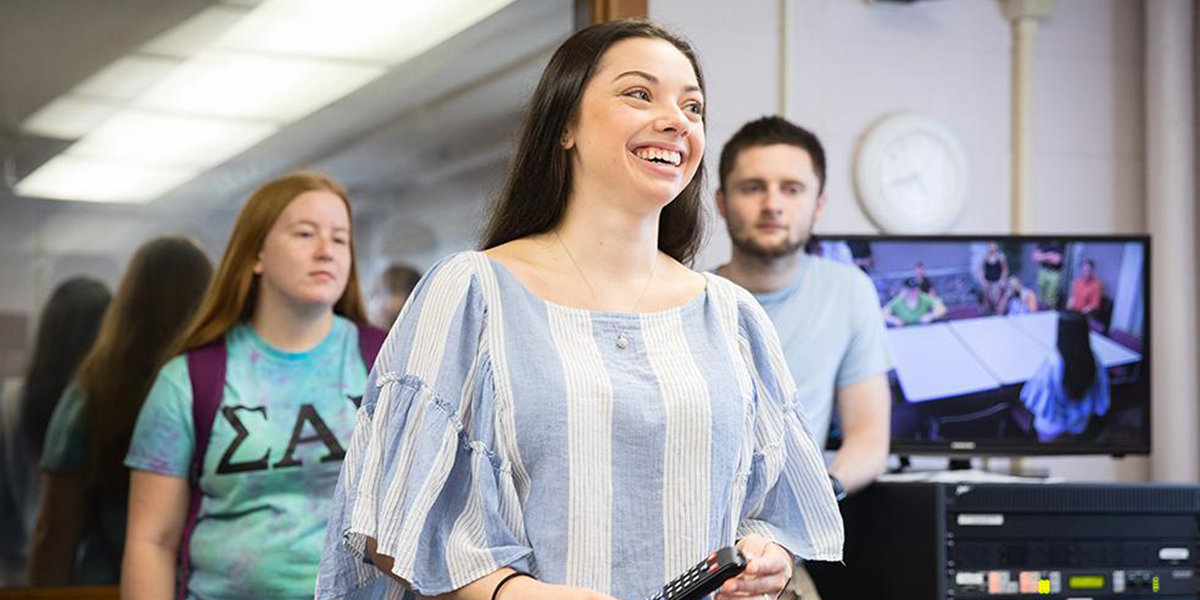

Dominique Kornely, a senior psychology major at the University of Wisconsin-Platteville, will present research on the effect of psychosocial stress on substance use in college students while at the 16th annual Research in the Rotunda event on Wednesday, April 17, in the Capitol Rotunda in Madison.
Kornely was one of approximately 100 students across the UW System selected to present their undergraduate research. The event provides an opportunity for Wisconsin students and faculty members to share their research findings on a variety of important topics with legislators, state leaders, UW alumni and other supporters.
Kornely, a native of Manitowoc, Wisconsin, examined the link between stress and decisions to engage in risky substance use behavior.
“On college campuses nationwide, it is common for students to use substances such as alcohol, marijuana and cigarettes,” she said. “Research shows that stress leads to risky decision-making. It is also known that substance use is a common way of coping with stress.”
Kornely was mentored by Dr. Kameko Halfmann, assistant professor of psychology at UW-Platteville, who provided guidance, support and feedback that helped Kornely facilitate all aspects of the research study.
In June through August, Kornely began the research phase of the project as a Summer Undergraduate Scholar, reviewing more than 30 psychological journal articles examining how stress impacts decision-making, specifically decisions regarding risk. Through this research, she learned that stress may impact decision-making because of the stress response in the body.
Kornely used the knowledge she gained from the literature reviews to identify two main objectives for her research project: (1) to determine the effect of psychosocial stress on risky choices regarding substance use in college students and (2) to determine if the effect of an acute psychosocial stressor on substance use behavior is more prominent among individuals who have experienced chronic stress during childhood.
In July, as the first step in meeting these objectives, Kornely planned and implemented a preliminary study of nine students enrolled in summer school courses at UW-Platteville. After identifying students willing to participate in the study, Kornely randomly assigned each student to one of two groups: an experimental stress group and a control group.
Participants assigned to the experimental stress group completed a demographic data survey. Following, they completed the Trier Social Stress Test, a laboratory procedure used to induce stress in research participants; and two questionnaires. The stress test required them to prepare a speech in a short amount of time and deliver it in front of an evaluator as well as respond verbally to a challenging arithmetic problem, also in front of an evaluator. The purpose of the test was to induce psychosocial stress, akin to the kind of stress students might feel in one of their classes.
Afterward, participants in the experimental stress group completed questionnaires that collected data assessing how many alcoholic drinks they would purchase at various price points and their perceptions of the expected costs or benefits of using substances such as alcohol or marijuana.
Participants in the control group completed the demographic data survey and the same questionnaires the members of the experimental stress group had completed.
This fall and spring, Kornely completed data collection for her research study, which included approximately 89 UW-Platteville students. While Kornely did not find support for the original hypothesis that acute or chronic stress would increase substance use behaviors, she did find several interesting associations that offer avenues for further research.
For example, she found that:
- Acute psychosocial stress had no effect on substance use behaviors.
- Individuals who feel like they had more control over an upcoming stressor indicated they would consume more alcohol at one sitting, if the alcohol was free.
- Participants’ expected positive benefits (but not expected consequences) from substance use predicted their anticipated future engagement in substance use behaviors.
“These latter results seem to suggest that the expectation of benefits is primarily what motivates students to engage in substance use behaviors, rather than the fear of negative consequences,” said Halfmann. “This offers some additional insight into why DARE programs that focus on warning students about the dangers of drugs/alcohol do not seem to be particularly effective. Instead, future work should focus on how we can reduce the expectation of positive benefits from engaging in risky substance use behaviors.”
Kornely’s research was made possible by UW-Platteville’s new Summer Undergraduate Scholars Program, which provides students with an intensive summer scholarly experience that prepares them for graduate studies as well as helps enhance the culture of scholarship among students and faculty at UW-Platteville. Kornely’s research was also supported by the Undergraduate Research, Scholarly, and Creative Activity Scholarship, which provides awards to UW-Platteville students conducting scholarly activities during the academic year.
“The part of the program that I enjoyed most was interacting with Dominique and the other students who conducted research this summer,” Halfmann said. “These students are among the best and brightest, and their interactions and quality of participation were amazing. The Summer Undergraduate Scholars Program offered all of them an opportunity, beyond the regular classroom, to expand their minds and learn with their intellectual peers.”
Kornely noted that the program provided her with an invaluable, intensive scholarly experience that prepared her for graduate studies and her future career in mental health.
“Participating in the Summer Undergraduate Scholars Program gave me the opportunity to learn skills that I can use in graduate school and in my future career, such as how to do literature reviews, how to publish papers and how to collaborate with others,” said Kornely. “The program required a lot of hard work, time management and dedication. Along with gaining knowledge and learning new skills, the program also helped me make connections with others who are interested in different types of psychological research.”
“I used to not be the biggest fan of doing research,” Kornely admitted. “But the more I did it, the more questions I had, and the more I wanted to keep going. Now, research is something that I see myself doing for the rest of my career. The Summer Undergraduate Scholars Program is a great opportunity for students to get hands-on research in their fields and to gain knowledge on the process of doing research while exposing themselves to new areas of learning and new challenges they might not have thought about. This was such an amazing experience because I got to spend every day doing what I have learned to love.”
“Dominique is the perfect example of the student we want to reach through this program,” said Dr. Chris Underwood, assistant professor of geography at UW-Platteville and director of the Summer Undergraduate Scholars Program. “She was already a dedicated, smart and successful student, but immersion in an intensive research experience such as this can help her fully realize, as well as fine-tune, her academic and career aspirations.”
After she graduates from UW-Platteville in May 2019, Kornely is pursuing an MA degree in clinical science at the University of Northern Iowa, after which she hopes to earn a doctoral degree in clinical psychology and then pursue a career in mental health in a hospital setting.